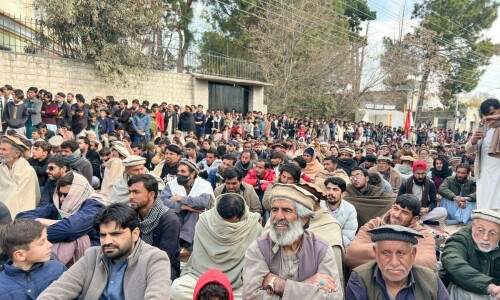
TEHRAN: The presidents of Afghanistan, Iran and Pakistan agreed on Saturday to join forces in combating militancy as they attended a counterterrorism summit in Tehran.
The joint statement by the three neighbours also came hot on the heels of an announcement by US President Barack Obama that Washington will withdraw 33,000 of its 99,000 troops from Afghanistan by the end of next summer.
“All sides stressed their commitment to efforts aimed at eliminating extremism, militancy, terrorism, as well as rejecting foreign interference, which is in blatant opposition to the spirit of Islam, the peaceful cultural traditions of the region and its peoples' interests,” the statement said.
“All sides agreed to continue meeting at foreign, interior, security and economy ministers' level to prepare a roadmap for the next summit due to be held in Islamabad before the end of 2011,” added the statement carried by Iran's official IRNA news agency.
Afghan President Hamid Karzai and his Iranian and Pakistani counterparts Mahmoud Ahmadinejad and Asif Ali Zardari held three-way talks on Friday ahead of a six-nation counterterrorism conference on Saturday.
The three leaders discussed “ways of battling terrorism, extremism and drug trafficking,” IRNA said.
In his speech at the opening session of the two-day summit, Karzai said that despite his government's efforts, militancy was on the rise both in his country and in the region.
“Unfortunately, despite all the achievements in the fields of education, infrastructure and reconstruction, not only has Afghanistan not yet achieved peace and security, but terrorism is expanding and threatening more than ever Afghanistan and the region,” the Afghan leader said.
President Zardari said: “Terrorists violate both human and divine values by inflicting death and destruction on fellow human beings. They have no religion.”
He said attacks had resulted in the deaths of 35,000 people in Pakistan, 5,000 of them law enforcement personnel, and material damage totalling $67 billion.
In his speech to the opening session, Ahmadinejad again accused the United States of using the September 11, 2001 attacks as a “pretext” for sending troops to the region.
“In light of the way it was approached and exploited, September 11 is very much like the Holocaust,” the Iranian leader charged.
“The American government used the attacks as a pretext to occupy two countries, and kill, injure and displace people in the region,” he added.
“If the black box of the Holocaust and September 11 is opened, many of the realities will come to light. But unfortunately despite worldwide demand, the American government has not allowed it.”
Ahmadinejad has repeatedly courted controversy by questioning the accepted version of both the September 11 attacks, which killed nearly 3,000 people in the United States, and the Holocaust.
He has dubbed 9/11 a “big lie” and a “suspect affair” similar to the Nazi Holocaust, which he dismissed as a “myth” shortly after coming to power in 2005, triggering an international outcry.
In his message to the counterterrorism conference, which was also attended by the leaders of Iraq, Sudan and Tajikistan, Iran's supreme leader Ayatollah Ali Khamenei also spoke out against what he charged was Western abuse of the terrorist threat.
“The diabolical calculation of the dominating powers is to exploit terrorism as a tool to gain their illegitimate aims and they have used it in their plans,” he said in the message which was read out to the conference.
“In their view, terrorism is whatever threatens their interests. They consider those who are fighting for their legitimate right against occupiers as terrorists but do not consider their mercenaries and malicious groups who harm innocent people as terrorists.”
Iranian Foreign Minister Ali Akbar Salehi said the next conference of the six nations would be held in Baghdad next year, and a permanent secretariat would be opened in Tehran.












































Dear visitor, the comments section is undergoing an overhaul and will return soon.